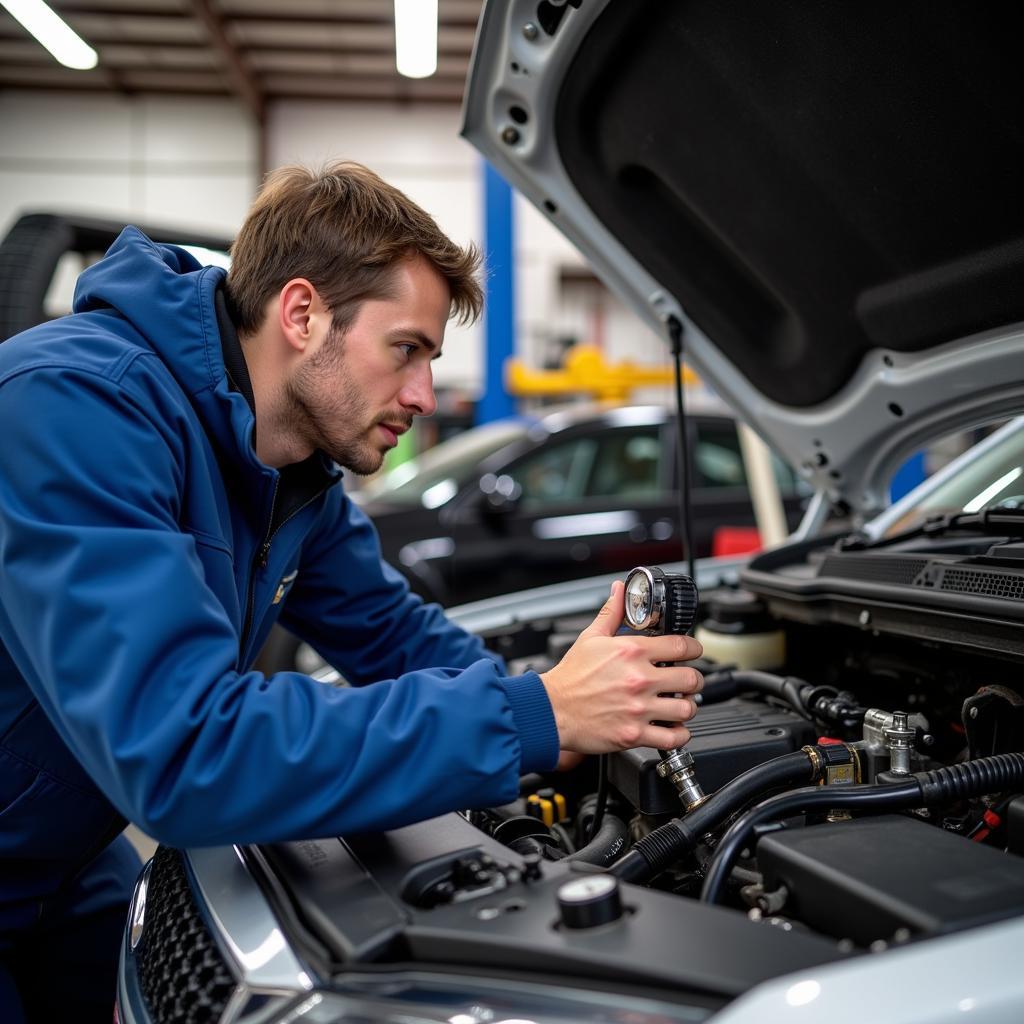What is Minor Service on Car?
A minor car service is a routine check-up and maintenance procedure designed to keep your vehicle running smoothly and prevent potential problems. It’s a vital part of car ownership, ensuring safety, reliability, and longevity. Understanding what a minor service on car entails can empower you to make informed decisions about your vehicle’s upkeep. This article will delve into the intricacies of a minor car service, explaining its importance, what it includes, and how it differs from a major service.
Do you want to ensure your car stays in top condition? A minor car service is a cost-effective way to achieve this. what is a minor car service It’s a preventative measure that addresses wear and tear before they escalate into major repairs.
Understanding the Importance of a Minor Car Service
Regular minor services are crucial for maintaining your vehicle’s health. They help identify potential issues early on, saving you money on costly repairs down the line. A well-maintained car is also safer, performing optimally on the road. Additionally, consistent servicing can improve fuel efficiency and reduce emissions, contributing to a greener environment.
Why Minor Service is Essential for Your Car’s Longevity
Think of a minor car service as a health check-up for your car. Just as regular doctor visits help maintain your well-being, minor services keep your car running smoothly. These services address wear and tear on essential components, preventing premature failure and extending the lifespan of your vehicle.
What Does a Minor Car Service Involve?
A typical minor car service includes a range of checks and replacements focusing on essential components. While the exact procedures can vary slightly depending on the make and model of your car, and the specific service schedule recommended by the manufacturer, the core elements remain consistent. These often involve an oil and filter change, checking and topping up essential fluids, inspecting brakes, tires, and lights, and a thorough visual inspection of the engine compartment.
Key Components of a Minor Car Service
Here’s a breakdown of the key components included in a typical minor service:
- Oil and Filter Change: This is perhaps the most crucial aspect of a minor service, as it ensures proper lubrication of the engine.
- Fluid Checks and Top-ups: This includes coolant, brake fluid, power steering fluid, and windshield washer fluid.
- Brake Inspection: Checking the brake pads, discs, and lines for wear and tear.
- Tire Inspection: Checking tire pressure, tread depth, and overall condition.
- Light Check: Ensuring all lights are functioning correctly.
- Visual Inspection of Engine Compartment: Checking for any leaks, damage, or loose components.
Knowing what is done in a minor car service will give you peace of mind knowing your car is in expert hands. A comprehensive inspection by a qualified mechanic can identify potential problems before they become major issues.
Minor Service vs. Major Service
While both minor and major services are essential for car maintenance, they differ significantly in scope and frequency. A minor service is a more frequent, less extensive procedure, typically performed every 6 months or 10,000 miles. A major service, on the other hand, is a more comprehensive procedure performed annually or every 20,000 miles. It includes all the elements of a minor service, plus additional checks and replacements of more complex components.
How Often Should You Get a Minor Service?
The recommended frequency for a minor car service can vary depending on the manufacturer’s guidelines, your driving habits, and the age and condition of your vehicle. As a general rule, it’s recommended to get a minor service every 6 months or 10,000 miles, whichever comes first. Consult your car’s owner’s manual for specific recommendations. You may also consider consulting with a trusted mechanic to determine the best service schedule for your individual needs. For more information on the typical duration of a minor service, check out our guide on how long does a minor car service take.
Conclusion
A minor car service is a crucial investment in your vehicle’s health, safety, and longevity. By understanding what a minor service on car entails and adhering to a regular maintenance schedule, you can keep your car running smoothly, prevent costly repairs, and enjoy a safer and more reliable driving experience. Don’t neglect this vital aspect of car ownership.
FAQ
- What is the difference between a minor service and a major service? A minor service is a routine check-up, while a major service is more comprehensive.
- How often should I get a minor service? Generally, every 6 months or 10,000 miles.
- What is included in a minor car service? Oil change, fluid checks, brake inspection, tire check, and a visual inspection.
- Why is a minor service important? It prevents major problems, improves safety and fuel efficiency, and extends the lifespan of your car.
- How much does a minor car service cost? The cost varies but can save you money on major repairs in the long run. For detailed pricing, refer to our guide on how much is a minor car service.
- Can I perform a minor service myself? While some tasks can be DIY, it’s best to have a qualified mechanic perform the service.
- What does a minor car service involve in terms of checks? It involves checking vital fluids, brakes, tires, lights, and the overall engine compartment. Want a more precise understanding? Refer to what does a minor car service involve.
Need assistance? Contact us via WhatsApp: +1(641)206-8880, Email: [email protected] or visit us at 456 Oak Avenue, Miami, FL 33101, USA. We have a 24/7 customer support team.

